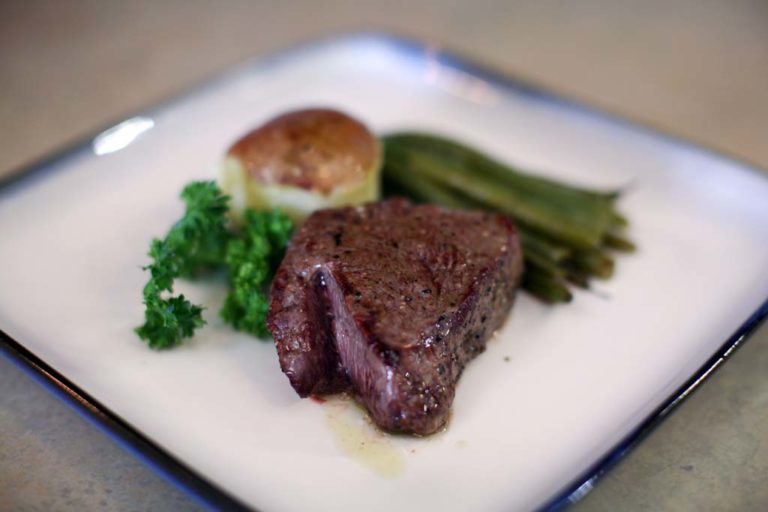
Chef's notes:
The top sirloin steak is located just to the rear of the short loin (immediately behind the ribs), in front of the round section (the back end), and above the bottom sirloin section (between the two). The beef tenderloin can also be found in this section, on the other side of the bones. If you buy a pin bone, flat bone, or wedge bone sirloin steak, it is possible to end up with a little chunk of tenderloin. Unfortunately, when you buy top sirloin, the bone and tenderloin have been removed. Conversely, the bottom sirloin, a firmer and less desirable steak, has also been removed.
When you buy top sirloin, ask the butcher for the first cut, the cut closest to the front end of the cow. This will be the tastiest cut of top sirloin.
Ingredients
- 2 lb. beef top sirloin
- Sea salt
- Black pepper
- Vegetable oil
Broiled Top Sirloin Cutlets Seasoned with Sea Salt and Black Pepper
- Get some top sirloin from the butcher. As I said before, ask the butcher for the first cut of top sirloin, from the end closest to the head. The top sirloin steak should most closely resemble the steak on the left in this picture. The long, thin muscle, when trimmed away from the top sirloin, is called a sirloin cap steak. The steak on the right is the bottom half of the top sirloin (the butcher cut them in half for some reason).
- Trim the top sirloin steak into single portions. For serving, presentation, and eating purposes, I like to trim the top sirloin steak into three steaks. Two of these vaguely resemble tenderloin steaks. Perhaps that’s why some butchers sell them as Chateaubriands? It is easier to flip smaller steaks when broiling them. If I were to cook a top sirloin steak on the grill, I might consider leaving it whole and slicing portions after resting.
- Season the top sirloin steaks with salt and pepper. Top sirloin is a fairly tender piece of meat, similar in tenderness to strip loin. Which is tender enough to not need any crazy marinating or tenderizing. So, like the many other steaks that I have cooked and enjoyed over the years, I season my top sirloin with salt and pepper. Sea salt and fresh cracked black pepper is all a steak ever needs. For the broiler, I rub the steak with a little vegetable oil to encourage browning.
- Broil the first side of the top sirloin steak. Turn the broiler on high and move an oven rack to the second slot from the top. This should leave about 5‒6 inches between the meat and the heat. Let the broiler preheat for a few minutes before you stick the meat under it. As the first side cooks for a minute or two, keep your eye on it. Broiling can be tricky at first.
- Broil the reverse side of the top sirloin steak. Once the first side has achieved a nice brown exterior, broil the other side. Use a digital thermometer to determine when it has cooked to your preference, use the list of temperatures below as a guide. If you use a digital thermometer with a detachable probe, you will be able to monitor the internal temperature of the steak as it rises, allowing you to remove the steak right when it hits your target temperature. Don’t forget to let it rest for a few minutes before you eat it.
Tips & Tricks
- Use a digital thermometer to test the internal temperature of the steaks. The following guide should help: Rare: 120‒125ºF Medium-rare: 130‒140ºF Medium: 140‒150ºF Medium-well: 150‒160ºF Well done: 160‒170ºF. There is a little room for error—but not too much.
- Some broilers are wimpy and can’t get the job done. If you find that your meat is coming out grey and bland when you cook it to the right temperature, the broiler may be shot. You could try moving the meat closer, but if that doesn’t work, you may have to get a new broiler. I recommend getting a gas one, if you can. Gas broilers tend to be hotter.
- Leave the meat alone. Flipping the meat more than a couple times may increase the time it takes to brown the exterior, which may overcook the interior.
- Let the steak rest on a rack, loosely covered. Some liquid will come out, but not all of it.
